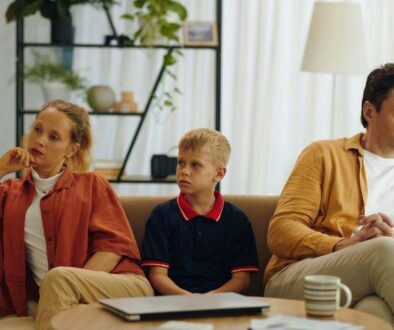When Can My Child Choose Their Preferred Parent To Live With?
The general answer to the above query, under Wisconsin law, is a child cannot ever decide until the individual child reaches the age of majority. However, the analysis does not end there, with regards to the expressed wishes of a minor child to a Guardian ad Litem in a child’s wishes in custody/placement litigation process.
Statutory Considerations
Under Wisconsin Statute sec. 767.41 (5) (am) 2, the law considers the following factor, among others, for the placement and custody of minor children. “The wishes of the child, which may be communicated by the child or through the child’s guardian ad litem or other appropriate professional.” The Guardian ad litem statute for minor children, sec. 767.407 (4) reads in part, “Unless the child otherwise requests, the guardian ad litem shall communicate to the court the wishes of the child as to the child’s legal custody or physical placement under s. 767.41 (5) (am) 2.”
Guardian Ad Litem’s Role And The Child’s Wishes In Custody
Under Wisconsin law the court-appointed guardian ad litem needs to consider the wishes of the child and absent an objection by the child, those wishes are to be communicated to the Court. The Guardian Ad Litem is responsible for the investigatory component of the custody/placement matter being contested in Court. Various other factors that the court needs to consider in deciding custody and placement issues of minor children, include the child’s wishes in custody. However, the wishes of the child are definitely not controlling, and may, in certain cases, conflict with what the court appointed Guardian Ad Litem or the court may feel is in the child’s best interest. Wisconsin statutes do provide that the Court must consider the wishes of the child when making a placement determination. However, the child does not get to make the ultimate decision in a contested custody/placement matter. It is up to the parents, via stipulation, or the Court, via a contested hearing, to make a placement decision.
Age Factor In Decision Making
The wishes of the child become more paramount in deciding custody and placement as the child ages and matures. This means that the older a child becomes, the more weight that is given to the child’s opinion/position on the matter (in most, but certainly not all, cases). For instance, the court is not going to be controlled by a seven-year-old stating that they want to live equally with both parents. On the flip side, when a child is in their teens, and as they approach to adulthood, the court is probably not going to force a 16-year-old to live with a parent, if the 16-year-old chooses not to be forced to go over to the other parent’s house anymore, due to some conflicts, drama or personal issues that may exist between the child and the parent (or the parent’s new significant other or his/her children). There is no hard and fast rule regarding the aforementioned, however, and the Guardian Ad Litem and Court are trained to keep an open mind under all circumstances. There are certainly cases where an 11-year-old child, for instance, will have very valid reasons for wanting to live primarily with one parent over the other, and are very able to explicate those reasons (such as neglect, excessive alcohol use by a parent, physical/verbal/sexual abuse) to a Guardian Ad Litem.
Variability Among Court Officials
The issue becomes even murkier, depending on the particular Court official presiding over the particular case at hand. Some judges and family court commissioners take the position that a child never gets to decide and at any age the child should be forced to have placement with the other parent and the court order followed, even where that child does not want to stay or visit with the other parent. Other judges and family court commissioners take the angle in their analysis (and ultimate decision in the case) that you cannot ever force a child after age 15 to have placement with the other parent or visit with them, if that teenager refuses to go and spend time with the other parent. Of course, particular circumstances may exist that warrant a deeper look at a particular situation. For instance, abuse or neglect concerns should be examined with a great deal of detail and scrutiny. However, if the request for the change, as delineated in the filed motion before the Court, is that the child simply wants the placement change (with no further substantiation or explanation), such a request is not likely to be successful before any legal trier-of-fact in the state of Wisconsin.
Considerations For Teenagers
Often times, children are fast to blame the parent who may have caused the divorce. Sometimes, children will simply refuse to attend the scheduled placements with a particular parent. Teenagers are, in many situations, quick to want to stay only with that parent who gives them the most amount of freedom and refuse to stay with the parent who imposes strict rules and guidelines in their home. Sometimes, the relationship between parent and child has been damaged so much that the only solution is to attempt counseling to try and repair the damage.
Practical Aspects
While the wishes of children needs to be considered from a legal perspective at any age, it can be expected that children less than 15 years of age have probably little input over the decision making of their parents, or the court, when setting the child’s wishes in custody and placement orders. As children reach their teen years, after 15 years of age, it can be generally expected that their wishes will be strongly considered and there is a very real likelihood, that at that age, the parents, as well as the court, should follow the wishes of the child in terms of what their custody or placement may be. Bottom line–combining the law with practicality (and having been on both sides of this particular issue many times during my legal career), I think you have to use common sense when it comes to forcing teenagers to visit with the other parent, when there may be personal issues going on that interferes in a normal parent-child relationship.
Need Assistance?
If you have questions/concerns about a child custody/placement dispute, please feel free to contact our family law attorneys to schedule a consultation.




